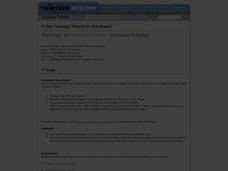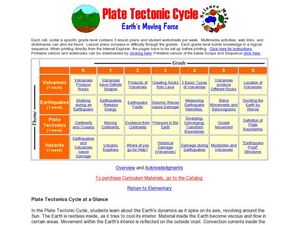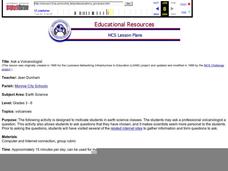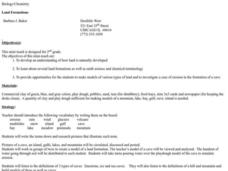Curated OER
Shake, Rattle, and Roll: Mt. St. Helens - Lesson Plan 2
Students compile information on volcanic activity at Mount St. Helens. In this earth science lesson, students use the information they gathered on Mount St. Helens to answer questions and create charts in Excel. Then students...
Curated OER
Earth's Plate Tectonics
Students identify the different layers of the Earth. In this earth science instructional activity, students create a model of the crusts and continents. They explain how plates movement cause earthquakes and volcanoes.
Curated OER
The Gifts of the Nile
Get your class thinking about the geography that shaped the Egyptian landscape and culture. They compare ancient climate zones and geogrpahical fetures, locate evidence of plate tectonics, take and quiz, and write a short essay. The...
Curated OER
Creating a Disaster
Students construct a volcano model. For this earth science lesson, students determine the structure and build of their volcano. They explain the danger of volcanic eruptions.
Curated OER
The Biggest Plates on Earth
The best part about teaching guides is all the great information you can use to inform your class. They infer what type of boundary exists between two tectonic plates. Then, using given information on earthquakes and volcanism they'll...
NOAA
Plate Tectonics II
Mid-ocean ridges, rift valleys, island arcs, mountain ranges, earthquakes, volcanoes ... there are so many features associated with plate tectonics. The 14th installment of a 23-part NOAA Enrichment in Marine sciences and Oceanography...
Curated OER
Ready to Erupt!
Students observe a visual representation of a volcano erupting. They measure and sketch the volcano and discuss how engineers use this information. They discover the type of equipment used to indicate an eruption.
Curated OER
Plate Tectonics
Students simulate the three types of plate boundaries using robots. In this earth science lesson, students explain how earthquakes and volcanoes are formed. They collect real-world earthquake data and plot them on the map.
Curated OER
Erosion in Different Soils [Erosion Races]
Fourth graders review how erosion can happen by wind, water, and gravity which they studied in previous lesson plan. They attempt to discover if all soils erode at the same rate. In small groups, 4th graders experiment with three...
Curated OER
Ape Cave
Young scholars prepare for a field trip to Mount St. Helens National Volcanic Monument and exploration of Ape Cave (see also Ape Cave Exploration). In the absence of a field trip, students become acquainted with lava tubes in general.
Curated OER
Our Savage Planet in the News
Students explore extreme earth phenomenons. In this savage planet lesson, students explore and report on various types of severe weather and earth phenomenons using the Internet, a word processor, or other multimedia device.
Curated OER
Tracking Current "Earth" Events
Eighth graders utilize Internet research skills, and practice their communication skills by presenting their research to the clas. They actively consider the types of hazards for humans associated with Natural Disaters and ways that...
Science Matters
Wave Watching
Seismologists use the direction and arrival times of p waves and s waves to determine the distance to the source of an earthquake. The engaging lesson has students line up to form human waves. Through different movements when attached,...
Curated OER
Friend, Foe, or . . .
As a result of this lesson, upper elementary ocean explorers will be able to describe several interrelationships: symbiosis, mutualism, commensalism, and parasitism. They learn that the biological richness is increased near seamounts and...
Curated OER
A Hydrothermal Adventure
Students analyze hydrothermal vents. In this hydrothermal vents lesson, students discover the effects of hydrothermal vents on tectonic plates. Students make model hydrothermal vents to understand how they form and operate.
Curated OER
Impact Craters
Young scholars investigate the factors affecting the size of a crater. In this space science lesson, students collect data from the activity and graph them. They explain how velocity of impact relate to crater size.
Curated OER
Plate Tectonic Cycle
Students explore the Earth's movements by completing worksheets. In this plate tectonics activity, students define such natural disasters as volcanoes, earthquakes, tsunamis and mudslides and discuss their connections to plate tectonics....
Curated OER
Volcano Under the City
Students examine the different flow rates of liquids and how lava's viscosity influences flow. In this liquids lesson students complete several handouts and a lab activity.
Curated OER
Volcanic Violence
Students complete activities to study volcanic activities. In this volcanic activities lesson, students read an article about violent volcanoes. Students complete discuss questions and volcano projects for the lesson. students also take...
Curated OER
Ask a Volcanologist
Students ask a professional volcanologist a question online. This lesson allows students to ask questions that they have chosen, and it makes scientists seem more personal to Students.
Curated OER
Cruising the Mantle
Students explore the plate boundaries of the earth. Through the use of video, internet and hands-on activities, students examine the types of plate boundaries. They create a model to illustrate the movement and interaction of the...
Curated OER
TE Lesson: Tsunami Attack!
Students examine how earthquakes, volcanoes, and landslides can trigger tsunami waves. They determine how engineers use sensors to detect the dangerous wave, and how they help design building that will survive the wave force and water.
Curated OER
Living with Disaster: Mother Nature Rules
Students analyze various types of natural disasters and discover techniques man uses to live with nature and to control nature. They are able to identify ways that man has learned to predict natural disasters; identify ways that man has...
Curated OER
Land Formations
Second graders explore land formations. In this science lesson plan, 2nd graders develop an understanding of how land is naturally developed, investigate several land formations as well as earth science and chemical terminology, and ...
Other popular searches
- Three Types of Volcanoes
- 3 Types of Volcanoes
- Different Types of Volcanoes
- 4 Types of Volcanoes
- Volcanoes Types








![Erosion in Different Soils [Erosion Races] Lesson Plan Erosion in Different Soils [Erosion Races] Lesson Plan](http://content.lessonplanet.com/resources/thumbnails/140405/large/cgrmlwnvbnzlcnqymdezmdmyos01nde3lxfmmzy0dc5qcgc.jpg?1414240121)














